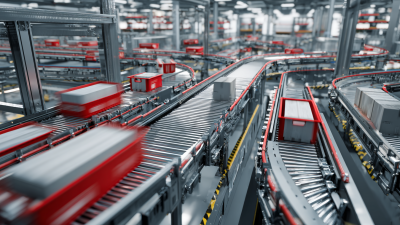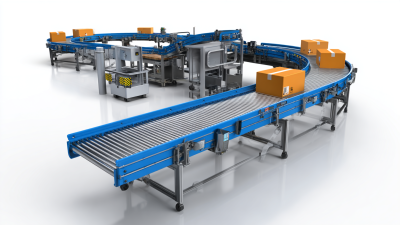In today's fast-paced industrial landscape, the role of technology in optimizing operational efficiency cannot be overstated. Designed conveyors have emerged as a pivotal innovation in the manufacturing and logistics sectors, streamlining material handling and enhancing productivity. According to the latest report by Market Research Future, the global conveyor systems market is projected to reach USD 7.2 billion by 2026, with a compound annual growth rate (CAGR) of 4.9% from 2019 to 2026. This growth is largely attributed to the increasing demand for automated processes within various industries, including automotive, food and beverage, and pharmaceuticals. As companies strive for more effective ways to manage their workflows, understanding the impact of Designed Conveyor technology becomes essential not only for maintaining competitiveness but also for achieving sustainability in operations. This tutorial aims to explore the advancements in designed conveyor systems and their transformative effects on modern industries.

The integration of conveyor technology in modern manufacturing processes is pivotal for enhancing operational efficiency and productivity. According to a report by the Material Handling Industry of America (MHIA), over 80% of manufacturers have identified conveyor systems as a key element in their automation strategies. When implementing such technology, industries must consider several key factors to maximize benefits.
First and foremost, the adaptability of the conveyor system to specific manufacturing needs cannot be overstated. As noted in a survey conducted by the International Society of Automation (ISA), 62% of manufacturers reported significant improvements in workflow efficiency after customizing their conveyor systems to fit their unique production lines. This customization allows for better handling of diverse products, leading to reduced downtime and inventory costs. Additionally, energy efficiency has emerged as an essential consideration; conveyor technology has evolved to include energy-saving features that not only minimize operational costs but also meet environmental sustainability goals. A study by the Conveyor Equipment Manufacturers Association (CEMA) highlights that energy-efficient conveyor systems can reduce energy consumption by up to 30%, significantly lowering the carbon footprint of manufacturing operations.
Lastly, the importance of worker safety and ergonomics must not be overlooked. According to safety audits, 50% of workplace accidents are linked to manual material handling, which can be mitigated through the implementation of conveyor systems. By enabling safer ergonomic designs, companies can enhance the well-being of their workforce while simultaneously boosting overall productivity. Hence, careful consideration of these factors is crucial for manufacturers looking to successfully implement conveyor technology.
Conveyor systems have become indispensable in modern production processes, significantly enhancing efficiency across various industries. According to a report from the Material Handling Industry of America (MHIA), automated conveyor systems can improve productivity by 30% to 50%, particularly in sectors like manufacturing, distribution, and logistics. The seamless movement of materials reduces manual handling and minimizes the possibility of injuries, thereby creating a safer work environment.
Furthermore, data from Research and Markets suggests that the global conveyor system market is expected to reach $8.6 billion by 2025, reflecting a compound annual growth rate (CAGR) of 4.4%. This growth is driven by the increasing demand for advanced systems that integrate technology such as IoT and AI. By optimizing workflows and reducing operational costs, conveyor systems not only increase production rates but also enable businesses to respond swiftly to market demands. In essence, the evolution of conveyor technology stands as a testament to the critical role it plays in streamlining production processes and enhancing overall efficiency.

In modern industries, the integration of advanced conveyor technology not only enhances operational efficiency but also plays a crucial role in maintaining safety within the workplace. Tailored conveyor designs are implemented with safety protocols that focus on minimizing risks associated with material handling. For instance, the incorporation of emergency stop mechanisms and overload sensors ensures that any unforeseen incidents can be quickly addressed, preventing injuries and maintaining a secure environment for all personnel.

Moreover, conveyor systems are often equipped with features such as guarded access points and warning lights that alert workers to potential hazards. These adaptations are essential in high-volume settings where fast-paced operations can lead to accidents if not properly managed. Training employees to understand and adhere to safety protocols related to conveyor systems further solidifies a culture of safety within the organization. By prioritizing these measures, industries can streamline processes while safeguarding their most valuable asset—their workforce.
In today's fast-paced industrial environment, the adaptability of conveyor systems has become a crucial asset for companies looking to optimize their operations. Customization options allow businesses to design conveyor solutions that specifically meet the unique challenges of their industry, whether it’s food processing, automotive manufacturing, or e-commerce distribution. By tailoring conveyor systems to align with operational workflows, organizations can enhance efficiency, reduce downtime, and minimize waste.
The integration of advanced technologies such as IoT and automation further amplifies the potential for customized conveyor solutions. Industries can implement intelligent conveyor systems that not only transport materials but also adapt in real-time to changing demands. This flexibility enables a quicker response to market fluctuations, allowing businesses to maintain competitive advantages. As companies increasingly recognize the importance of personalized conveyor technology, they pave the way for innovation and greater productivity within their sectors. Thus, custom-designed conveyors are not just a trend; they are becoming a foundational element of modern industry strategies.
The future of conveyor technology is poised for transformative innovations that will redefine efficiency and automation in various industries. As companies strive to enhance productivity, the integration of smart technologies becomes paramount. IoT-enabled conveyor systems, equipped with real-time monitoring and predictive maintenance capabilities, are leading this charge. These advancements allow for seamless data collection and analysis, empowering operators to optimize operations and minimize downtime.
Moreover, sustainability is a growing focus in conveyor design. Emerging trends include the use of eco-friendly materials, energy-efficient motors, and innovative designs that reduce waste. Companies are adopting modular conveyor systems that can be easily adjusted and expanded, providing flexibility to meet changing production demands while aiming to reduce their carbon footprint. This commitment to sustainability not only aligns with global standards but also appeals to environmentally conscious consumers, ultimately driving industry standards forward.
With a robust integration of AI and machine learning, future conveyor systems will be able to adapt to various workloads, improving safety and overall performance. The convergence of these technologies signals a new era where conveyor systems are not just transport mechanisms but integral components of smart manufacturing ecosystems.
| Industry Sector | Current Conveyor Technology | Emerging Innovations | Projected Impact |
|---|---|---|---|
| Manufacturing | Traditional Automatic Conveyors | Smart Conveyor Systems with IoT Integration | Increased efficiency and real-time monitoring |
| Logistics | Belt Conveyors | Automated Guided Vehicles (AGVs) | Reduction in labor costs and increased throughput |
| Food Processing | Stainless Steel Conveyors | Hygienic Conveyors with Anti-Microbial Coatings | Improved safety standards and extended shelf life |
| Pharmaceuticals | Basic Gravity Conveyors | Automated Batch Tracking Systems | Enhanced traceability and compliance with regulations |
| E-commerce | Simple Roller Conveyors | Dynamic Intelligent Conveyor Systems | Faster order processing and improved customer satisfaction |






